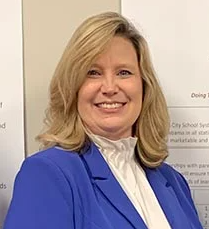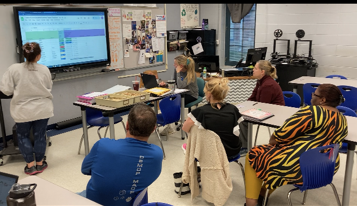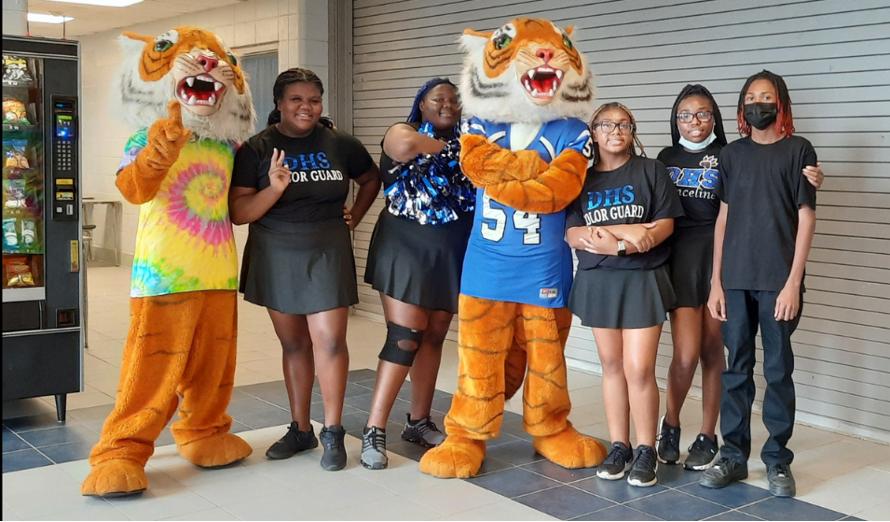May 2, 2024
Demopolis High School was chosen as the GRAD Partnership’s fifth spotlight school for its success in fostering student-centered mindsets as part of their implementation of a student success system. Demopolis is a rural high school serving about 614 students in the heart of the Alabama Black Belt region. Under the leadership of Principal Terina Gantt, Demopolis partnered with the GRAD Partnership in the Fall of 2023, as part of a cohort of ten schools supported by GRAD Partnership Intermediary, The University of West Alabama.

Demopolis used the GRAD Partnership’s student success system framework to launch a mentorship program driven by a shared set of student-centered mindsets. At the end of their first year of implementation, Demopolis High saw significant improvements in attendance (an 8% drop in chronic absenteeism), academic achievement and growth.
Demopolis utilized the mentor program as a proactive approach to student success, rather than a remedial one. While the original idea of the program was to connect seniors at risk of not graduating with caring adult volunteers from the existing school staff, the team quickly realized senior year was simply too late to begin interventions. To meet the needs they saw, they pivoted to establish mentor connections across all grades, starting in the student’s freshman year.

“When I saw this GRAD Partnership opportunity, I knew it would be a great program. My idea was to have staff mentors to aid with student attendance, which in turn would help our students stay on track for graduation.”
Mrs. Gantt, Demopolis Principal
While staffing shortages and educator time are a reality for rural and small schools, the Demopolis team has lightened the load by engaging all adults in the building in the mentorship model – coaches, counselors, lunchroom staff, janitors, administrators, and teachers alike. This whole-school team of caring adults started by preparing a simple shared spreadsheet of metrics on attendance, behavior, grades & connectedness for all their high school students. In the past two years, this spreadsheet has grown and become more sophisticated so that it is easier to update and can provide the DHS staff access to real-time data whenever they need it.
The student success team uses their data, along with insights from faculty and staff, to identify students who are in need of support. This framing exudes empathy and a belief that all students can be supported, both characteristics of the strong student-centered mindsets Demopolis leadership has intentionally fostered.
Since it began, the mentor program has been well-received by students, in part because of how the mentors and mentees were paired: each teacher identified two to three students with whom they believed they could form the strongest connections. This process turned out to be one of the most impactful parts of the program, creating meaningful and lasting connections between students and adults.
“What struck me was when I told my students that ‘I chose you’ – their faces lit up. Since then, my mentees come to see me each day, and often seek me out more frequently to have a check in conversation.”
Caitlyn White, Demopolis Science Teacher
Mentors check in with students either once per week or once every other week, depending on the student’s need. Those in the monitor category meet less frequently, but maintain a strong connection to their mentor. While mentors check in about grades, finding a club or area of interest for students who are not involved in an activity, or behavior or attendance, the fundamental purpose is for students to know they have a caring adult in their corner.
The student success team meets at least quarterly to check in with one another and update and evaluate the spreadsheet – often breaking into small groups of 9th, 10th, 11th and 12th grade mentors. Though data is monitored in real-time, meeting quarterly to re-evaluate mentor assignments and the level of need for each student ensures that each student has ample time to develop a strong relationship with their mentor before any changes to meeting frequencies are made.

Word about the mentor program has spread, with staff, parents, and students seeing the benefits, and the culture of Demopolis High changing for the better. Recently, Mrs. Gantt had a parent stop by to request a mentor for her son because she feared that he had been thinking of dropping out during his junior year. Though he had previously not been on the school’s radar (all of his indicators are on track), they jumped to action and assigned him a mentor for extra support. In addition to helping improve attendance and course performance, the mentoring program has also led to timely mental health interventions that may not have been possible without the core commitment to centering students’ needs and strengths – an approach that ensures students have a trusted caring adult to reach out to.
“We are learning more about our mentees’ behavior through these conversations. We are learning about their family, their mental health and so many other topics some students did not feel comfortable sharing before establishing these relationships.”
Jill Tutt, Demopolis English Teacher
“Through our student success system, we were discovering students who were struggling with addiction or having suicidal ideations, and we were able to intervene and provide support. These systems aren’t just creating productive citizens, they’re saving lives.”
Mrs. Gantt, Demopolis Principal
Mentors themselves have also expressed how much they have personally benefited from powerful conversations with their students.
“I’m here for my students, and I have also benefited from the mentor program – I feel more connected to my students.”
Courtney Kerby, CTE Department Head

Demopolis in the News
- Opinion: Strong connections to adults lead to better attendance by students (Atlanta Journal Constitution, June 11, 2024)